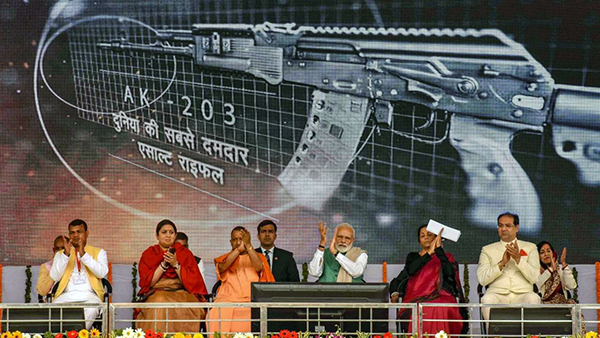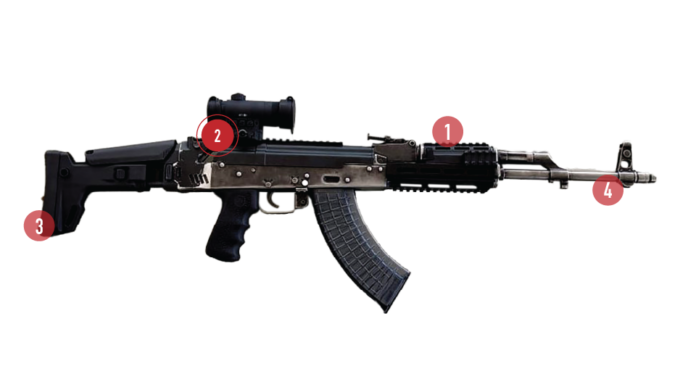SSS Defence to Make Small Arms
SSS Defence is set to become the second private sector company in India to manufacture small arms for the local and export markets after PLR Systems Ltd (PLR), a joint venture between Adani Group and Israel Weapon Industries (IWI). The four-year-old firm SSS Defence emerged as the lowest bidder for a contract to upgrade a small number of Indian Army’s AK-47 assault rifles, beating off competition from established Israeli rival Fab Defense.
It will begin manufacturing and testing small arms at its new facility that will be operational in Bengaluru in January 2022, with the complex also housing a first-of-its kind underground weapons testing tunnel to determine their effectiveness. A 150-metre-long tunnel will be set up as the first underground facility by a private sector company in the country for testing and evaluation of weapons ranging from pistols and assault rifles to carbines and sniper rifles. The testing process allows manufacturers to gather crucial tactical weapon data including muzzle velocity, action time and consistency.
Thus far it has built prototype weapons such as assault rifles and sniper rifles at a ‘bridge’ or make-shift facility in Bengaluru, and the new facility will allow the Bengaluru-based firm to ramp up annual production to 20,000 assault rifles and 3,000 sniper rifles depending on orders.
The upgrade would entail a new foldable butt stock for the rifle, a new dust cover that will allow mounting of sights, and changes to the fore end, which will allow mounting of a bipod or a knife when needed, besides hand guard and vertical grip. SSS has also offered to upgrade the rifle with a flash hider at no extra cost, since it was not part of the requirements issued by the particular unit of the Army. While all upgrades by Fab Defense involved parts made of polymer, SSS Defence is offering aerospace alloys.
The weapons to be manufactured at SSS Defence’s eight-acre unit at Jigani near Bengaluru’s well-known technology hub, Electronic City, include the Viper and Saber sniper rifles, P-72 assault rifles and the P-72 carbines. The weapons facility represents an investment of around ₹200 crore.
The company is also setting up an ammunition manufacturing plant at Anantapur in Andhra Pradesh that is expected to be operational next year.
PLR Systems to Supply Navy With Israeli Pistols
The Navy has placed an order for the supply of 500 India-manufactured specialised Israeli Masada 9mm pistols for its elite commando unit with an Indian private firm, PLR Systems. These will replace the current lot of 9 mm pistols in use with the naval commands or MARCOS. The delivery of these pistols, along with specialised kits and sights, will be completed early next year. The order was placed under fast-track procurement procedure.
PLR Systems is a joint venture with Israel Weapon Industries (IWI), which has been bought over by the Adani Group. The production factory is situated in Madhya Pradesh’s Gwalior.
PLR is already supplying India-made rifles and pistols to central armed police forces (CAPF). The 56×45 mm chambered Tavor X 95, in use with the Special Forces and the CAPF, is already being manufactured in India and has been supplied to the Central Industrial Security Force (CISF).
Under the joint venture, PLR System is also making other smalls arms like Galil sniper rifles and Uzi Pro submachine gun with indigenous content ranging from 40-60 per cent under transfer of technology.
Even though these systems are in use with the defence forces and manufacturing is taking place in India, fresh orders are hard to come by. This is because in case of a repeat order, the contract is sent to IWI directly instead of the local manufacturing unit. This happens because an order to the local manufacturing unit would mean a change in the name of the contracting firm. Under the procurement rules, this would be seen as a contract being given to a new company. This means that fresh trials will have to be held, even when it is the same rifle manufactured in India with a large indigenous component.
Thales to Invest $1.2 Billion in India
French aerospace and defence major Thales Group is betting big on India — especially the emerging drone space here — and has decided to invest a billion euros (about $1.2 billion) in the country over the next five years.
Its drone offerings — that range from manufacturing to traffic management and countering rogue drones — will account for a significant part of this planned mega investment.
India currently has 6 lakh drones, a number that the French major expects will rise at least six times in 5-8 years. “Our solutions allow civil and military aviation authorities to detect — even without data transmission — and verify a drone’s registration number, identify its pilot, and confirm its flight authorisation, all in a few seconds. By the same time, to cope with unexpected or non-registered drones, detection and classification are the first steps before engaging a graduated response,” says Ashish Saraf, Thales India VP & country director.
Russia waives royalty on AK 203 Assault Rifles
With Russia waiving a royalty clause in favour of technology transfer, the green signal has been given for the deal to manufacture AK 203 assault rifles at the Amethi factory. The Rs 5,124 crore contract is likely to be inked in the coming months, with production expected to commence next year.
All issues related to the cost and indigenisation content that had held back the project till now have now been sorted out and a go-ahead has been given by the Defence Acquisition Council.
Central to the cleared proposal will be a full technology transfer for the rifles that are to be manufactured in India. In earlier discussions, the Russian side had asked for a royalty on each rifle being produced in India. This has now been waived and India will pay for technology transfer, waiving the royalty.
The move, sources said, would result in saving of at least Rs 200 crore in the coming years and would ensure that India gets the knowhow to produce modern assault rifles that can also be exported in future. As part of the contract, 70,000 rifles will be imported directly from Russia while 6,01,427 will be produced by an OFB-Kalashnikov joint venture.
The ongoing restructuring of the Ordnance Factory Board (OFB) is not expected to have any impact on the joint venture for the production of AK 203 rifles and a complete transfer of technology is expected to be achieved within 32 months of the contract.

The plan to manufacture has been under discussion for almost two years, with the contract stipulating 100% transfer of technology and possible exports in future from the Indian plant. The Amethi factory in Amethi was inaugurated in 2019 but production is yet to commence.
As the AK 203 deal was being negotiated, the army had placed import orders for the Sig Sauer 716 assault rifles, which were priced at Rs 89,000 a piece. Emergency financial powers were used to order 1.4 lakh of the US-made rifles. In contrast, the Russian origin rifles that will eventually be fully produced in India are expected to cost a little over Rs 70,000 per piece after production starts.
Solar Industries to Develop Armed Drones
Solar Industries or Economic Explosives Ltd (EEL) has developed the first indigenous drones and loitering munition systems. The munition loiters over a given area and swoops down to strike when the target is located. Two fixed winged planes and a hexacopter have been developed.
The systems are billed to be better suited to the terrain along all Indian frontiers. The Army at present has similar systems from Israel and Polish sources.
Apart from the drones, the company has also developed anti-drone missiles, which can fire a salvo and take on a swarm of drones well before it can strike. User trials are planned in the coming months for different versions of the drone as well as the anti-drone systems.
EEL is a fully owned subsidiary of Solar Industries Limited (SIL) — headed by businessman Satyanarayan Nuwal. Solar Group will be the first indigenous company to develop it in-house. The company as developed three versions weighing 1.5kg, 4kg and 10kg, with range of 15, 25 and 100km respectively.
The EEL release said it has developed the anti-drone system, which is capable of soft kill, which means impairment of its system, and also striking it down using micro missiles. This is also the first of its kind in India.
Armed Forces’ Emergency Powers Extended Again
The Defence Ministry has once again extended the emergency powers accorded to the Army, Navy, Air Force and the Integrated Defence Staff (IDS) for urgent revenue procurements and works amid continuing tensions with China along the Line of Actual Control (LAC) in eastern Ladakh, even as the ministry emphasised strengthening the existing rules of procurement.
Emergency powers for revenue procurements through fast-track process have been extended for three more months till December 31. This is the third extension of emergency powers granted for revenue procurements since last year when they were first invoked. While they were first extended till March from December last year, they were again extended till August this year.
No extension was, however, granted to the emergency powers accorded to the three Services for capital procurements.
The ministry has also stressed on the need to strengthen the existing procurement processes under the Defence Acquisition Procedure (DAP) for capital procurements and Defence Procurement Manual (DPM) for revenue procurements, instead of frequently bringing in emergency powers for urgent procurements.
The emergency revenue procurement powers were delegated under the respective Army, Navy, Air Force and Integrated Defence Staff Schedule of Powers under the revised Delegation of Financial Powers to Defence Services (DFPDS-2021) unveiled by Rajnath Singh in September this year.
DAC Approves Proposals Worth Rs 7,965 crore
The Defence Acquisition Council (DAC), in its meeting of 2 November 2021, accorded Acceptance of Necessity (AoN) for capital acquisition proposals for modernisation and operational needs of the Armed Forces amounting to Rs 7,965 crore. All of these proposals (100%) are under ‘Make in India’ with focus on design, development and manufacturing in India.
Key approvals of procurement from domestic sources include twelve Light Utility Helicopters from Hindustan Aeronautics Limited (HAL); Lynx U2 Fire Control System from Bharat Electronics Limited (BEL) which will enhance the detection tracking and engagement capabilities of Naval war ships and Mid Life Upgradation of the Dornier Aircraft from HAL to increase the Naval capacity of maritime reconnaissance and coastal surveillance.
As a further impetus to ‘Aatmanirbhar Bharat’, a global procurement case of Naval guns has been foreclosed with these guns’ quantity added to the upgraded Super Rapid Gun Mount (SRGM) being manufactured by Bharat Heavy Electricals Limited (BHEL). These SRGMs provide niche capabilities of engaging fast manoeuvring targets using guided munitions and range extensions and are to be fitted on the warships of the Indian Navy.
Ban Lifted on AgustaWestland & Leonardo
India has formally lifted the ban on Italian firm AgustaWestland and its parent company Leonardo, paving the way for them to take part in the multiple ongoing projects and bid for upcoming defence contracts.
One of the earliest casualties of the scandal, in fact, was the cancellation of India’s proposed Rs 1,200 crore deal to buy Black Shark heavy-weight torpedoes from a Finmeccanica subsidiary for the six French-origin Scorpene submarines being constructed at Mazagon Docks.
It was in early-2012 that allegations of Rs 360 crore being paid as bribes to Indian politicians, bureaucrats and IAF officers to swing the Rs 3,546 crore deal to supply 12 AW-101 VVIP helicopters had first surfaced in a probe by prosecutors in Italy. The deal had been inked in 2010.
The ban on Leonardo SpA and its subsidiaries had “limited India’s options” in the international arms market because the conglomerate produces a wide array of weapon systems ranging from torpedoes and 127mm naval guns to radars and short-range surface-to-air missiles.
The defence ministry’s decision to resume business with Leonardo SpA is “subject to certain conditions imposed on the company.” Under the conditions, Leonardo SpA cannot make any commercial claims or file any civil suit against the Indian government for any previous deal. Moreover, new business dealings will take place “without any prejudice” to the ongoing investigations into the alleged VVIP helicopter scam by the CBI and Enforcement Directorate, which will continue.
A new notification dated 12 November, issued by the Defence Ministry with a list of firms debarred/put on hold/suspended from doing business with it, does not name both the Italian companies that were banned in 2014 by then Congress-led UPA government over allegations of kickbacks in the VVIP chopper scam.
Leonardo has given a letter withdrawing its claims on Euros 350 million for the cancelled order of the VVIP choppers.
Lifting of the ban will allow Leonardo, earlier known as Finmeccanica, to participate in the Project 75 of the Indian Navy, under which six Scorpene submarines are being built. The submarines, four of which have been delivered to the Navy, do not have the heavyweight torpedoes that were to be procured from Leonardo. This acquisition got hit as the Italian firm was blacklisted and there was no leeway.
The lifting of the ban also ensures that Leonardo will be able to take part in upcoming Naval tenders for the new radars and turrets for its warships.
Multiple extensions of suspension of business dealing with Leonardo were given since 2014 and the last was to expire by end-November.
According to the government decision, while the ban would be lifted, the probe by the Central Bureau of Investigation and the Enforcement Directorate would continue into the Rs 3,600 crore VVIP chopper scam. The ban in 2014 had led to the company’s exclusion from a large number of defence projects where it had products to compete with others including multiple naval helicopters deals.
The company had also gone through a global re-branding exercise and changed its name from the scam-tainted Finmeccanica to Leonardo in 2016. Headquartered in Italy, Leonardo products and solutions are used in over 150 countries worldwide.
Leonardo was among the 15 arms companies on the “put on hold/suspended” list of the defence ministry till September this year. At the top are six companies, including Singapore Technologies Kinetics, Israel Military Industries, Rheinmetall Air Defence (Zurich) and Corporation Defence (Russia), which are “debarred” completely.
Engine manufacturer Rolls Royce and Tatra truck manufacturer (Czech Republic), in turn, are the four companies with whom “restricted procurements” are allowed on the basis of operational urgency, national security and non-availability of other alternatives.



















